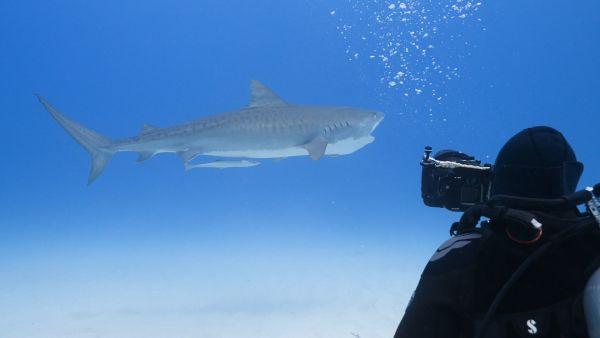Conservationists are protecting the ocean with help from an unusual partner - CNN's Call To Earth

In a special half hour documentary Call to Earth: Expedition Bahamas, CNN meets Dr. Austin Gallagher, marine biologist and founder and CEO of Beneath The Waves, who is working with sharks and turtles to study “Blue Carbon” ecosystems in the Caribbean.
The Bahamas is on the front line of the impacts of global warming. Dr. Austin Gallagher has been exploring here for over a decade: “When I started my career, I feel like I was handed a treasure map and right in the middle of that treasure map was the tiger shark.” A discovery that potentially holds endless promise for this island nation - and beyond.
From 2016 to 2020, the Beneath The Waves team conducted a study where they equipped tiger sharks with cameras. The aim was to gain a better understanding of what a day in the life of the animal looks like. What came back was hours of groundbreaking footage that would change the trajectory of their research, says Dr. Gallagher, “We knew that there is generally expansive seagrass ecosystem in The Bahamas. But it wasn't until we got the data back from those camera-equipped tiger sharks that we really saw how important and expansive the seagrass really might be here.”
Whether in the lab or in the field, Beneath The Waves has focused much of its recent attention on so-called “Blue Carbon” ecosystems. Dr. Gallagher explains, “Things like seagrasses, mangroves, salt marshes and through natural processes like photosynthesis, these plants sequester and store massive amounts of carbon - significantly more than their terrestrial counterparts.”
The tiger shark research revealed that the Bahamas Archipelago has one of the planet’s most significant “Blue Carbon” spaces. The footage retrieved from their shark cams, combined with satellite mapping and additional underwater surveys led to, what Dr. Gallagher calls, a “holy grail” moment in animal science: “And it actually ended up validating a prediction of up to 93,000 square kilometres, about 50,000 square miles of seagrass ecosystem here in The Bahamas, which makes it by far the largest on earth. It was hiding in plain sight. You know, sharks get a bad rap, but frankly, without these apex predators, we don't know what's happening in the ocean. And so protecting that ocean space and making sure that it's healthy and that the ecosystem is healthy, is one of the most important things that we can do.”
CNN followed Dr. Gallagher’s team during a four-day expedition where they began to expand their research to sea turtles and attach satellite trackers on their shells and ID tags on their flipper, following established protocols. “It's really about examining these relationships as holistically as possible, and that turtle link between the tiger shark and the seagrass meadow is really where we want to go in the future,” he explains.
For the Bahamas, the discovery is opening up new doors, particularly in its fight against the increasing intensity of natural disasters. “It's important because it's an opportunity for us to not be independent, but certainly put us, as a country, in a position where we can monetise some of the natural assets that we have to offset the impact of climate change. That we are not contributing to, but yet we are on the front line, taking the first impact from these hurricanes,” Anthony Ferguson, Director of Carbon Management Limited tells CNN.
Bahamians like Ferguson are working with Beneath The Waves under a private-public partnership to establish a science-based marketplace where the commonwealth of the Bahamas can develop and sell blue carbon credits. The potential buyers are companies, investors and even other countries, looking to offset their carbon emissions. The aim is to have the project accredited by 2026.
To do that, they’ll need to continually measure how much greenhouse gas the meadows are holding. “The sediment cores that we were able to collect in the field, they definitely do have a monetary value. And it's actually quite high because the carbon sequestration market, has the potential to be quite valuable for these small island developing states,” says Tadzio Bervoets, Science and Policy Board Member of Beneath The Waves .
For Dr. Gallagher, “We need to work in partnership with nature, whether we're talking about a 14-foot tiger shark or a blade of seagrass. For me, it's about reframing our relationship with nature. And projects like the one that we have embarked on here speak to that.”
He concludes, “I love doing the work. I love coming to places like this. This is what inspires me to be a scientist. The ultimate goal of the work that I'm doing is to create empathy for the ocean and to also preserve what we have for future generations […] it's really about making sure that the legacy of these incredible ecosystems remains as intact as possible for as long as possible.”
See more from Call to Earth:
Background Information
CNN
With its strong heritage of offering extensive coverage and analysis of international events and stories of global importance, CNN is the world’s leading global 24-hour news network celebrating more than 30 years at the forefront of delivering fast, accurate, impartial news to a global audience of more than 260 million households.
With its global team of 4,000 news professionals based across 45 bureaux worldwide, CNN continues to invest in intelligent and compelling news, feature and documentary programming across its traditional and digital platforms.
CNN’s service continues to evolve, embracing social media, encouraging user-generated content via its community site iReport and reaching its audiences in new and exciting ways. CNN can be accessed online and on mobile devices and its distribution outlets include airports, hotel rooms, cruise ships and syndicated news agencies.
CNN
With its strong heritage of offering extensive coverage and analysis of international events and stories of global importance, CNN is the world’s leading global 24-hour news network celebrating more than 30 years at the forefront of delivering fast, accurate, impartial news to a global audience of more than 260 million households.
With its global team of 4,000 news professionals based across 45 bureaux worldwide, CNN continues to invest in intelligent and compelling news, feature and documentary programming across its traditional and digital platforms.
CNN’s service continues to evolve, embracing social media, encouraging user-generated content via its community site iReport and reaching its audiences in new and exciting ways. CNN can be accessed online and on mobile devices and its distribution outlets include airports, hotel rooms, cruise ships and syndicated news agencies.






